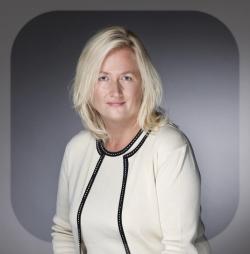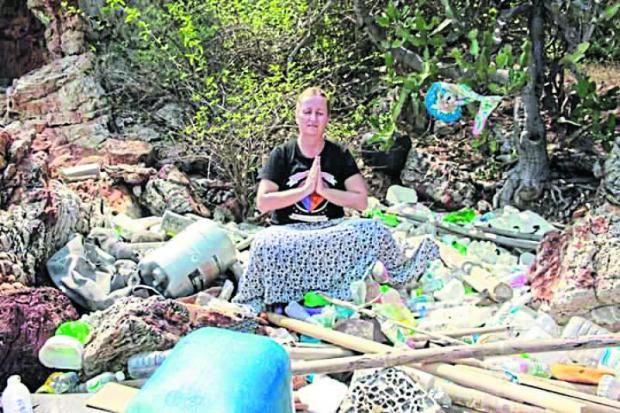Plastic pollution is an ever-increasing threat to health and the environment, signalling a desperate call for change. Madeleine Recknagel aims to fight the "throwaway" lifestyle we have become so accustomed to by leading a zero-waste lifestyle with a philosophy of rethink, refuse, reduce, reuse, repair, recycle and rot. The lecturer gives talks and hosts workshops at various institutions and events, highlighting issues, as well giving out solutions on the use of plastic. She recently did a talk at TEDxChiangMai last year titled 'From Sustainable Self to Sustainable Us'. She has a blog and Facebook/Instagram page called "The Sustainable Self", which serves as a platform for her to provide tips and insights to hosting community workshops on how to live a waste-free lifestyle.

Why did you decide to make lifestyle changes after a trip to Koh Phangan in 2015?
It's not like I've never seen waste before, but that was when I really paid attention to what was on the beach. That's when it really got to me; these are products I used everyday. So what can be done about it? It's very easy to say that's not my waste, so I went home and turned the waste bins over. It's very easy to blame it on the government for not taking responsibility, but I think I can only achieve change if I understand the challenges that come along. My friends help set up a blog: 'The Sustainable Self'. If you look at it, it is very simple. My friend suggested I should communicate more to the outside and create a way for people to see what they can do at home, and then I decided to create a Facebook page, which has more updates. I never thought anybody would be interested since we are talking about waste. In the last 1.5 years, I spent a lot of time thinking how should we change and the first step is changing yourself. You have to be aware and educated on the impact of your carbon footprints.
You call yourself a 'nearly' zero waste blogger, what does that mean?
Now, I call myself a zero waste advocate. Even though we're talking about trash, waste is also how we travel on a daily basis. I have a bicycle but I can't use it everywhere in Bangkok. I'm realistic in reducing waste but I have other carbon footprints that are relevant and important. Once you're aware about your waste, it's easier to change. It has to be simple, otherwise nobody will change.
As 'The Sustainable Self' what do you do?
The Sustainable Self represents me as a person, a mantra for life. I deliver talks and host workshops on sustainability. I started consulting last year because companies are interested in changing employee behaviour. I work full-time at Bangkok University and delivering talks and workshops started developing slowly -- in the last 1.5 years. It's positive to see companies wanting to change such as supplying bamboo or metal straws in the canteen. I want them to be more aware of reducing waste going into landfills and less poison in the groundwater.
How did you achieve the zero waste lifestyle?
I follow a step-by-step approach in leading a holistic lifestyle known as the seven R's. First, is to 'rethink' your lifestyle. What changes can you implement to reduce your single use consumption habits? 'Refuse' what you don't need by just saying no. Say no to single-use plastics whether it is bags, straws, styrofoam containers, cups, etc. 'Reduce' what you don't need by downsizing and sharing items with others. 'Reuse' what you already have, for example shop with reusable items and buy second-hand. 'Repair' what is broken and avoid buying new items. 'Recycle' what you cannot refuse, reduce, or reuse; try to aim to recycle less. 'Rot' your organic waste by creating community garden compost.
What can people do to help make a change together?
Look at your life and see what changes you can make without making it difficult. I'm always careful giving tips because most depends on the person's situation. For example, if they don't have an office job then they can't bring their own mug in everyday because it's not their main priority. It's really about taking a step back and analysing what can they do as an individual and get their family involved.
In your Ted Talk, you spoke about not having bought clothes in three years and this was made possible through swap meets. What are other alternatives to recycle clothes?
I've never been much of a shopper, I would rather buy one sustainably-made product because it lasts for 10-15 years. In terms of recycling clothes, look at what you have and if it's broken, fix it. I have a lady close to the university who fixes clothes that I really like and it costs me B150 for three pairs of pants. It's looking at how many clothes I need and maybe buy fewer pieces. Everything that is cotton, I can put in my compost bin, as it breaks down. The clothes have to be able to feed back into the natural cycle.
What are your future plans?
I want to get more people united, more policy changes, education to be more aware that the environment shouldn't be one degree on its own. It needs to be in the DNA of everything whether it's the corporate strategy, university, school. We have over 7 billion people in the world, we can't do all this awareness right now just to make it a trend of 2019, this is for years to come. I think something needs to happen and my focus is to scale it up and reach as many people as I can and see what has worked in the past. We are sitting in a lot of local wisdom and knowledge but for some reason it wasn't hip anymore, it got replaced with alternatives such as single-use plastics.
Visit The Sustainable Self on Facebook at bit.ly/2RYgrjy for updates.

